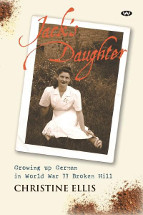Jack's daughter: Growing up German in World War 11 Broken Hill by Christine Ellis

Wakefield Press, 2017. ISBN 9781743055090
Recommended for mature readers of historical biography. Christine
Ellis writes a loving biography of her mother's life.
Maisie Schuster's father Jack died at the age of 54 years when she
was ten years old. His illness from pneumoconiosis (caused by dust
from mining) not only robbed him of his own life but also assigned
Maisie to a life of hardship and pain which she would not have
endured had he been present to protect and guide her through
adolescence.
Maisie and Jack had enjoyed an especially close and loving
relationship and the girl's life became miserable and unduly harsh
as she coped with a hard, sometimes brutal mother who appears to
have transferred her own suffering to the daughter. Circumstances
were made worse by the depressed economy and high unemployment in
their city of Broken Hill. The fact that Jack was German and World
War 2 had begun a year previously also meant that the family
suffered from suspicion, bullying and bureaucratic discrimination.
Given that the nation was at war, fear of enemy infiltrators is on
some level understandable, except when applied to families who had
been residents and model citizens for decades. Some aspects of the
security measures were breathtakingly stupid and unfair.
Life was incredibly tough for everyone at the time and for Maisie's
family living on the late Jack's compensation payments, frugal
attention to the spending of every penny resulted in them living in
what we would now recognise as desperate poverty. At the time
however it was simply accepted as hard times, with an observation
that the situation for others was worse.
Christine Ellis rejoices in her mother's resilience, resourcefulness
and kindness to others. Whilst I completely understand her pride, I
felt a great sense of sadness that this woman was perpetually
dragged down by others when she showed so much promise in her
achievements. Denied education by her mother, this academically
gifted achiever who yearned for a nursing career was instead pulled
out of school for domestic work at home, caring for her mother and
brothers. Refusing to give up, she set up her own hairdressing
operation and earned managerial positions in business, only to have
to leave to care for her manipulative and controlling mother who
subjected her to physical and emotional abuse, including savage
beatings.
Sadly, it would appear that this treatment conditioned Maisie to
perpetually relegate her own needs and wishes to those of her family
members and later an abusive husband. At times it seems that
Maisie's pain and misery will never end, yet I'm pleased to say that
hope and fulfilment are also present in this account.
Whilst heartbreaking in parts, Christine Ellis emphasises all that
was good in her mother's adventures and gives an affirming tribute
to her mother.
Rob Welsh